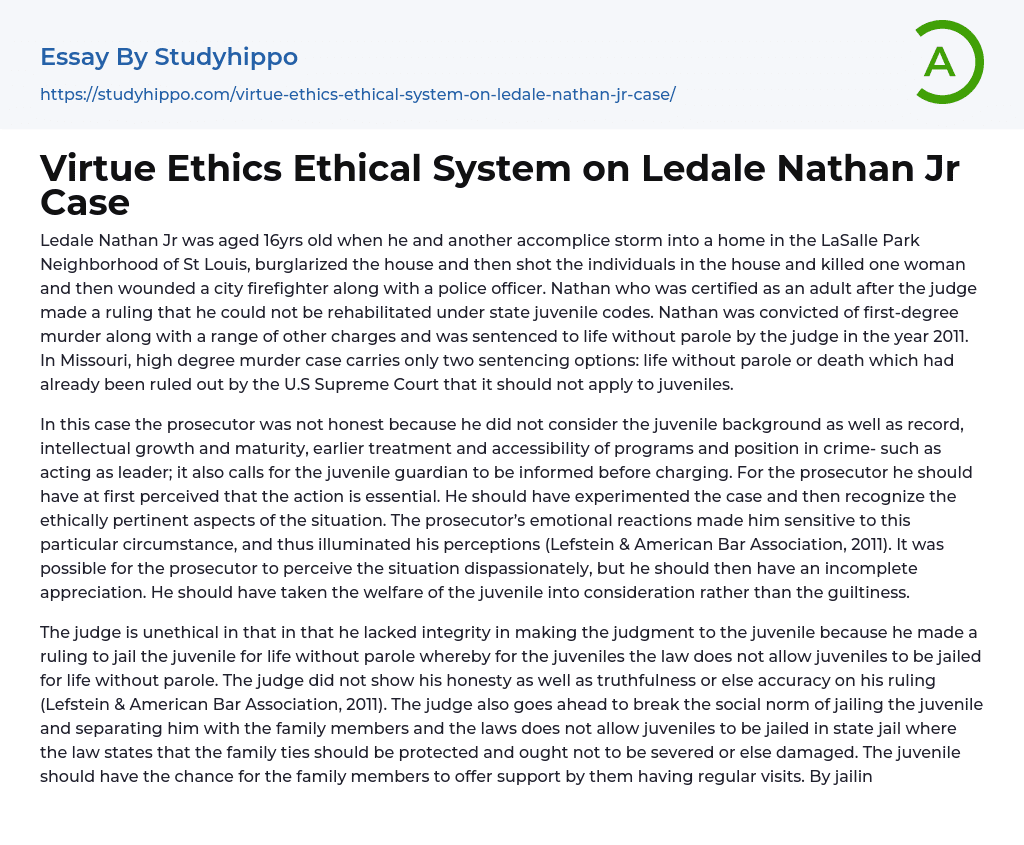

Virtue Ethics Ethical System on Ledale Nathan Jr Case Essay Example
Ledale Nathan Jr was aged 16yrs old when he and another accomplice storm into a home in the LaSalle Park Neighborhood of St Louis, burglarized the house and then shot the individuals in the house and killed one woman and then wounded a city firefighter along with a police officer. Nathan who was certified as an adult after the judge made a ruling that he could not be rehabilitated under state juvenile codes. Nathan was convicted of first-degree murder along with a range of other charges and was sentenced to life without parole by the judge in the year 2011. In Missouri, high degree murder case carries only two sentencing options: life without parole or death which had already been ruled out by the U.S Supreme Court that it should not apply to juveniles.
In this case the prosecutor was not honest because he did not consider the juvenile bac
...kground as well as record, intellectual growth and maturity, earlier treatment and accessibility of programs and position in crime- such as acting as leader; it also calls for the juvenile guardian to be informed before charging. For the prosecutor he should have at first perceived that the action is essential. He should have experimented the case and then recognize the ethically pertinent aspects of the situation. The prosecutor’s emotional reactions made him sensitive to this particular circumstance, and thus illuminated his perceptions (Lefstein & American Bar Association, 2011). It was possible for the prosecutor to perceive the situation dispassionately, but he should then have an incomplete appreciation. He should have taken the welfare of the juvenile into consideration rather than the guiltiness.
The judge is unethical in tha
in that he lacked integrity in making the judgment to the juvenile because he made a ruling to jail the juvenile for life without parole whereby for the juveniles the law does not allow juveniles to be jailed for life without parole. The judge did not show his honesty as well as truthfulness or else accuracy on his ruling (Lefstein & American Bar Association, 2011). The judge also goes ahead to break the social norm of jailing the juvenile and separating him with the family members and the laws does not allow juveniles to be jailed in state jail where the law states that the family ties should be protected and ought not to be severed or else damaged. The juvenile should have the chance for the family members to offer support by them having regular visits. By jailing the juvenile and having him serve the sentence in a state jail he is isolated from all the family members and friends which make the eventual integration back to his home more difficult.
The judge also lacks self control in that by making the final judgment on the case he should have considered the juveniles age and make a fair judgment taking into consideration what the law states. The judge should have considered a broad range of sentences which are available for the court. The judge should not have made the ruling by following the rules that are irrespective of internal attitudes and feeling, because the judge had a virtuous moral agent to have self control in his ruling. He had the capacity to make the ruling based on reason (Lefstein & American Bar Association, 2011). And
it is by reasoning that the judge could have determined how to act and make the judgment in a way that would be appropriate for this situation. For an individual it is not enough to have the virtues, though the judge should have the capacity to know how and when to exhibit these virtues. Thus the judge should have used rationality to make a wise ruling.
References
- Lefstein, N., & American Bar Association. (2011). Securing reasonable caseloads: Ethics and law in public defense. Chicago, Ill: American Bar Association.
- Animal Cruelty essays
- Charles Manson essays
- Crime Prevention essays
- Crime scene essays
- Criminal Justice essays
- Criminology essays
- Cyber Crime essays
- Damages essays
- Detention essays
- Distracted Driving essays
- Drug Trafficking essays
- Drunk Driving essays
- Forensic Science essays
- Gang essays
- Hate Crime essays
- Homicide essays
- Identity Theft essays
- Juvenile Crime essays
- Juvenile Delinquency essays
- Juvenile Justice System essays
- Law Enforcement essays
- Murder essays
- Organized Crime essays
- Penology essays
- Piracy essays
- Prison essays
- Property Crime essays
- Prostitution essays
- Punishment essays
- Punishments essays
- Rape essays
- Robbery essays
- Serial Killer essays
- Sexual Assault essays
- Sexual Assault on College Campuses essays
- Sexual Harassment essays
- Sexual Offence essays
- Stealing essays
- Surveillance essays
- Ted Bundy essays
- Victim essays
- Violent crime essays
- White Collar Crime essays
- Belief essays
- Deontology essays
- Ethical dilemma essays
- Moral essays
- Normative Ethics essays
- Values of Life essays
- Virtue essays



